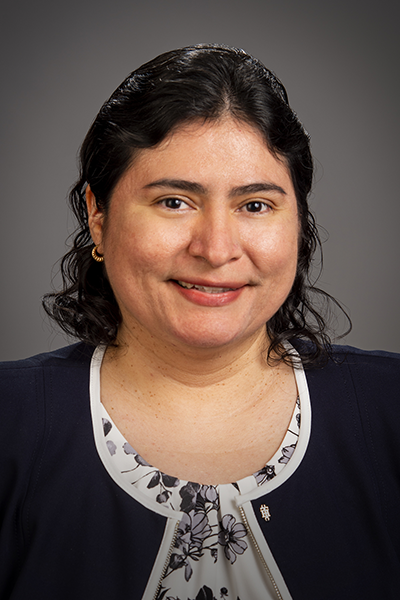- Communication
- Community
- Business
- Research
- Featured
WT Professor Part of Team Studying Conflict Resolution in Communication
Copy by Chip Chandler, 806-651-2124, cchandler@wtamu.edu
CANYON, Texas — A West Texas A&M University professor has joined colleagues from around the country in publishing groundbreaking research into conflict management.
 Dr. Leslie Ramos Salazar, WT’s Abdullat Professor of Business Communication and Decision Management in the Paul and Virginia Engler College of Business, was part of a team of experts who published “The Power of Assertive Communication in Conflict Resolution: Insights from Verbal Statements” in the highly regarded International Journal of Conflict Management.
Dr. Leslie Ramos Salazar, WT’s Abdullat Professor of Business Communication and Decision Management in the Paul and Virginia Engler College of Business, was part of a team of experts who published “The Power of Assertive Communication in Conflict Resolution: Insights from Verbal Statements” in the highly regarded International Journal of Conflict Management.
Also contributing were Dr. Steve Winer, director of the Institute for Relationship Communication; Amy M. Anderson, professor of communications at Spokane Community College; and Michael Busch, a seasoned consultant.
Conflict is an inherent component of any relationship, often accompanied by intense emotions like anger,” Ramos Salazar said. “Unresolved conflicts can lead to adverse outcomes, including relationship dissatisfaction, emotional abuse, and even relational dissolution, such as divorce. These repercussions can significantly impact individuals' mental well-being and overall quality of life.”
The study examined the verbal coding system developed by Dr. Winer, who meticulously analyzed over 4,000 video recordings of high-conflict situations involving anger in personal relationships spanning 15 years. This coding system revealed that using assertive verbal communication statements can yield positive conflict outcomes and enhance relationship satisfaction.
Those assertive statements were generally classified as “I-You” statements for the research, such as, “I’m angry with you for not helping me clean up our room. I want you to do your part, and I want to work this out with you.”
“It was perceived as likely to be listened to, effective at resolving conflicts, and instrumental in maintaining satisfactory relationships,” Ramos Salazar said. “The ‘I-You’ statement conveyed clarity, directness, honesty and respect, enabling the expression and understanding of authentic feelings. It also communicated a mutual willingness to collaborate in resolving the conflict.”
In the study, 175 university student participants from Texas and New York responded to survey questions exploring their perceptions of conflict in classroom and roommate interpersonal settings from the receiver's perspective. Additionally, participants ranked six distinct verbal communication statements based on their assertiveness, passiveness, and aggressiveness levels: “We,” “I-You,” “Question-Why,” “But,” “I” and “You.”
“We” statements—such as “We should both do more to clean up this room so we will not make each other angry”—were the most preferred to listen to, but they were also seen as passive, the least confrontational and ineffective at resolving conflicts or increasing relationship satisfaction, Ramos Salazar said.
“But” statements—like “At first, I liked having you as my roommate, but you do nothing to keep our room clean”—were perceived as the most aggressive, provoking feelings of blame and attack, often leading to relationship damage, and communicated an unwillingness to resolve conflict.
Similarly, “You” statements—like “You make me angry for not helping me clean up our room. You have to do your fair share”—came across as dominating, confrontational and uncooperative, Ramos Salazar said. Such aggressive statements were viewed as the least likely to resolve conflicts and the least likely to contribute to relationship satisfaction.
“These findings hold valuable insights for researchers, trainers and practitioners in the field. Understanding which verbal statements can escalate or de-escalate a conflict empowers professionals to help individuals express their feelings in ways that can strengthen relationships,” Winer said. “By actively listening to a client’s emotions and reframing aggressive or passive statements into assertive ones, practitioners can facilitate the sharing of emotions as information rather than attacks or withdrawals. This approach equips individuals with the tools necessary to build successful relationships based on open and effective communication.”
Meeting regional needs as a Regional Research University is a key component of the University’s long-range plan, WT 125: From the Panhandle to the World.
That plan is fueled by the historic One West comprehensive fundraising campaign, which reached its initial $125 million goal 18 months after publicly launching in September 2021. The campaign’s new goal is to reach $175 million by 2025; currently, it has raised more than $150 million.
About West Texas A&M University
WT is located in Canyon, Texas, on a 342-acre residential campus. Established in 1910, the University has been part of The Texas A&M University System since 1990. WT, a Hispanic Serving Institution since 2016, boasts an enrollment of about 10,000 and offers 59 undergraduate degree programs and more than 40 graduate degrees, including two doctoral degrees. The University is also home to the Panhandle-Plains Historical Museum, the largest history museum in the state and the home of one of the Southwest’s finest art collections. The Buffaloes are a member of the NCAA Division II Lone Star Conference and offers 14 men’s and women’s athletics programs.
—WT—

